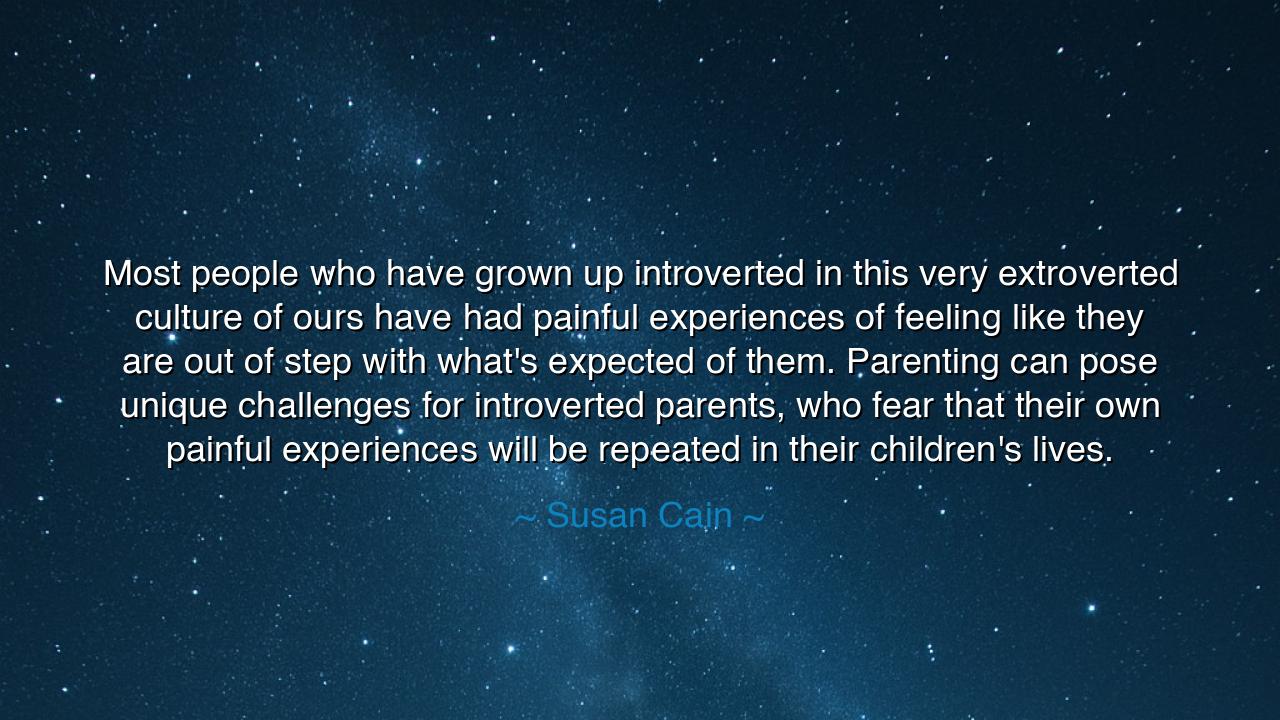
Most people who have grown up introverted in this very
Most people who have grown up introverted in this very extroverted culture of ours have had painful experiences of feeling like they are out of step with what's expected of them. Parenting can pose unique challenges for introverted parents, who fear that their own painful experiences will be repeated in their children's lives.






The words of Susan Cain, author of Quiet, shine a gentle yet piercing light upon the plight of the introverted soul in a world that celebrates extroversion. When she declares, “Most people who have grown up introverted in this very extroverted culture of ours have had painful experiences of feeling like they are out of step with what’s expected of them. Parenting can pose unique challenges for introverted parents, who fear that their own painful experiences will be repeated in their children’s lives,” she touches upon an ancient struggle: the longing to be true to one’s inner nature while facing a society that demands conformity to another. Her words are both a confession and a call to compassion, for they remind us that silence, depth, and gentleness are often overshadowed by noise, performance, and constant display.
The introvert, like a tree that grows inward before it flowers outward, often finds his strength in solitude and reflection. Yet in a culture that rewards the loudest voice and the most visible presence, such a tree may be judged as stunted or lacking. Cain reveals that this judgment leaves wounds—painful experiences of feeling alien, of being told implicitly or explicitly that quietness is weakness. To carry such wounds into parenthood is to carry both fear and tenderness: fear that one’s children will suffer as one did, and tenderness in the desire to protect them from the harshness of the world.
History, too, has seen the triumph and suffering of the introverted spirit. Consider Rosa Parks, who was by nature reserved, soft-spoken, and not inclined to public confrontation. Yet when the day came to resist the injustice of segregation, it was her quiet strength that shook a nation. Her act of stillness, her refusal to move, ignited movements more powerful than any shouting could have achieved. Her life shows us that introversion is not weakness, but a different kind of courage, one that may bloom quietly but change the course of history. Parents who are introverted must remember this: their children need not mimic the culture’s noise to live lives of greatness.
Cain’s teaching unveils a deeper truth about parenting: that we pass on not only our strengths but also our fears. The introverted parent, having borne the sting of feeling “out of step,” looks upon their child with double vision. They see the innocent child as they are, and the shadow of their own past pains looming behind them. This dual sight can make the heart anxious, always fearing that the cruelty of the crowd will once again descend. Yet it can also make the heart wise, teaching a parent to cultivate empathy, resilience, and the courage to honor difference.
The challenge, then, is not to mold the child into what society expects, nor to hide the child away in protective silence, but to guide them to walk proudly in their true nature. The introverted child must be taught that quietness is not a curse but a gift, that deep waters run still, and that reflection often sees further than noise. If the world rushes toward noise, let the child know that wisdom often comes in the pause between breaths. Thus, the introverted parent, through their scars, may raise children who are neither ashamed of silence nor fearful of solitude.
To all who hear this teaching, let it be remembered: culture’s expectations are like shifting sands, but the essence of one’s spirit is like a stone set in the earth. Do not fear if your way is not the way of the multitude. Do not tremble if your child is different from the crowd. Teach them instead to stand rooted in themselves, to know their worth even when unseen, to find strength in the inner chamber where few dare to look.
The lesson is clear: nurture uniqueness rather than conformity, honor both quietness and expression, and walk with courage even when the path is not the popular one. Parents must resist the temptation to force their children to wear masks of noise, and instead teach them to honor their true rhythm. In this way, pain is not repeated but transformed into wisdom.
Thus, Susan Cain’s words endure like a lantern in a noisy marketplace: a reminder that the quiet light, though small, can illuminate the darkest corners. Let the introverted parent take heart. Their story need not be one of repeated wounds, but of healing, resilience, and the passing down of a rare and precious gift: the strength to be wholly, quietly, and powerfully oneself.






AAdministratorAdministrator
Welcome, honored guests. Please leave a comment, we will respond soon